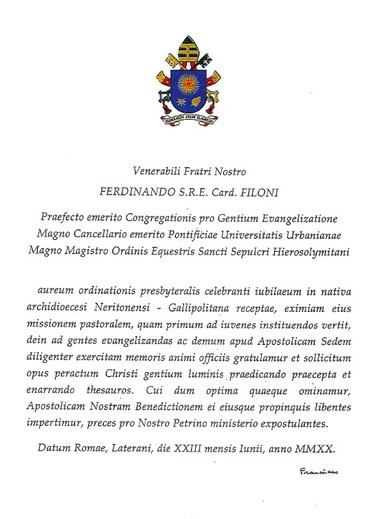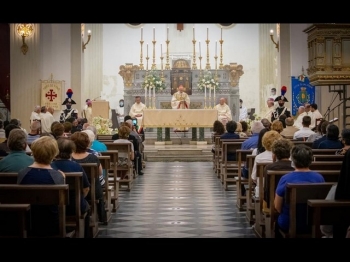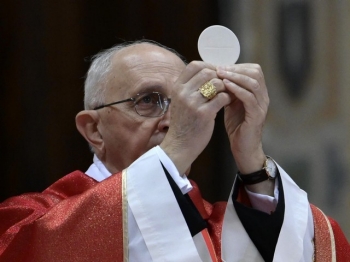Psalm 84 is called the 'Song of Pilgrimage.’ In the Liturgy of the Hours, the prayer priests and consecrated persons are called to mark their day with it, the following verse is recited: " Blessed are those, whose strength is in you, whose hearts are set on pilgrimage" (v. 6). This expression contains a blessing for those who undertake a 'journey' in faith, a spiritual 'journey' that involves a commitment of great personal importance: I am thinking of baptism, of those who join in Christian marriage, but also the choice of priestly and consecrated life.
As a priest, I recited this verse whenever the Liturgy placed it before me; it was like renewing the request for blessing for the commitment I made at my priestly ordination, on July 3, 1970, in the Mother Church of Galatone, at the hands of Bishop Antonio Rosario Mennonna, of revered memory. I recite it also to find support in God for fidelity to Him and to the sacramental grace I received.
Today I mark fifty years of priestly life; a goal achieved through a broad arch of my existence, which coincided with a significant period in the life of the Church, which I have loved and served. These were the fifty years after Vatican II, spent first in the parish service in Rome and then in the service of the Apostolic See; twenty of them as Bishop. I have lived many years in various countries: Sri Lanka, Iran, Brazil, China / Hong Kong, Iraq, Jordan and the Philippines; I remember everything about each one: events, ecclesial life, people. I have encountered both risk and fulfilment. I have visited pastoral regions in Africa, Asia and Latin America in order to get to know and encourage the missionary nature and evangelization of peoples. I have collaborated closely with three Popes: John Paul II, today a Saint, Benedict XVI, a father and a teacher, and the current Pontiff. I have met great ecclesial personalities, such as Mother Teresa of Calcutta, as well as martyrs to hatred of the faith such as Sister Cecilia Moshi Hanna, Dominican of Baghdad (2002), and the young priest Ragheed Ganni of Mosul (2007); in addition, numerous lay people and priests confessors of the faith for many years in Chinese prisons, politicians of all levels and many ordinary people who weave the threads of faith and charity every day in their family and in society; refugees who have survived ISIS and dramatic wars and, finally, many religious men and women of great human and spiritual depth and affectionate confreres in the priesthood. It was a journey together. I have never missed, even if only for short periods, the opportunity to return to my land of origin: here, where my parents are buried, to whom my grateful and loving thoughts turn today, where relatives and friends live, whom I greet with affection and thanks for their support in many circumstances.
Given the current global pandemic, the severity of which we have all closely experienced, I did not foresee any public celebration. I though perhaps in similar circumstances a day of silent recollection and thanksgiving to God would be more appropriate. However, the Bishop of our Diocese of Nardò-Gallipoli, Mons. Fernando Filograna, cared to organize, this Celebration together with the clergy and the Mayor of Galatone. As you can see, it has been organized with all of the measures appropriate to the circumstances. Thank you very much for your generous commitment and for this sign of personal attention.
From the time of his preparation for the sacred ministry, a priest knows well that he always has two primary tasks to devote himself to: the first - according to biblical teaching - is his dedication to the Most High: "You shall love the Lord your God with all your heart" (Dt 6:5; Mt 22:37); Saint Cyprian, bishop and martyr, taught not to "put anything before Christ". It is a nice lesson to keep in mind. The second, alongside the same commitment, is the exercise of pastoral charity, that is, service to one's neighbour and to all those whom the Lord will entrust to him and whom he will meet on his way.
In the highest degree, dedication to God and pastoral charity take place daily in prayer, both personal and liturgical, the centre of which is the Eucharist. In the Eucharist, we find the climax of both the spiritual and sacramental life of the Church, as well as the life of the priest. By entrusting this supreme Gift to his Disciples with the words - Do this in remembrance of me (Lk 22:19) - and then delivered by them to their successors, Jesus himself continues to re-actualize the Mystery of his own death and resurrection; the great Mystery of salvation and infinite love for humanity. The priest, therefore, perpetuates Christ's Offering to the Father, that is, he allows Jesus to re-propose it in every time and place by lending him his voice and his being; at the same time, the priest is allowed to be associated with Christ in his offering to the Eternal One.
In the celebration of the Eucharist, in fact, the Lord welcomes the invocation and prayer of the Church, which sacramentally implores him: Come Lord Jesus, Marana tha! (Ap 22:20), to express the impatient expectation of the pilgrim Church over time.
We therefore find two converging lines in the Eucharist: Jesus asking the Church to renew his offering to the Father, and the Church asking Jesus to be united with him in the same offering. The priest has this mission. All effort in evangelization, all regenerative forgiveness of the life of Grace and all cooperation in the service of peace and good in the world derives from this.
These few lines reveal that the priesthood of Jesus is not one particular activity among the others of the Son of God who became flesh. It is the redemptive mediation of the Person of Christ. His priesthood is not dynastic, it is not an elective democratic office, nor does it intend to create a 'caste'. Neither does it involve human adaptations, as would often be desired, to make it, so to speak, more modern and attractive and perhaps resolve certain vocational or pastoral needs, albeit noble ones. The Apostles themselves were careful not to change the will of the Master in the face of the increased needs of the primitive Christian community; they chose men for the service of charity by instituting the Diaconate, but reserving for themselves the Ministry of the Eucharist (prayer) and Preaching (word) (see Acts 6:4).
The priesthood of Christ, to which the priest is admitted by divine 'election' and by the confirmation of the Church, is therefore by nature a supernatural gift; it is an action in which the supernatural dimension with the outpouring of the Holy Spirit and the human dimension with the generosity of the person work together. With the celibate life, then, the priest becomes the "friend of the bridegroom", Christ. John the Baptist, in meeting Jesus at the Jordan, was considered not his cousin, but the "friend of the bridegroom", rejoicing at having listened to his voice: "For this reason my joy has been fulfilled. He must increase, but I must decrease." (Jn 3: 29-30). Paul VI (Sacerdotalis caelibatus), John Paul II (Ecclesia de Eucharistia) and Benedict XVI (Sacramentum caritatis) showed that celibacy "expresses in a special way the dedication which conforms him to Christ" (SC n. 24) and Francis describes it as "a rule of life and a gift for the Church" (interview 27.5.2014).
I would not like to conclude these thoughts without a brief reference to today's Liturgy of the Word, which, in the first Reading (cf. Zc 9:9-10) invites us to exult greatly; an invitation, all the more pertinent, the more you think about the Gift left by Jesus and received by the Church. In a vision, the Prophet Zechariah glimpsed the Messiah - righteous, humble and victorious - who, as St Paul then says in the second Reading (cf. Rom 8:9.11-13), conquered death and gave life. However, on this occasion the Gospel (cf. Mt 11:25-30) attracts my attention, because it is the passage of the prayer that the Lord addresses to the Father for his own. These are words that I feel valid for me and I would like to make mine, associating myself with the prayer of Christ:
I praise you, Father, Lord of heaven and earth, for the priestly ministry left to your Church in generosity and benevolence. Thank you for allowing me to receive the same ministry as your Son Jesus Christ and for associating me with his priestly mission; thank you for the knowledge that through him we have of you, Creator and above all merciful Father. Thank you because you allowed Jesus the Redeemer to take on my yoke, my fatigue, my fears and my cross. Thank you for the consolation of the Holy Spirit and for these fifty years of priestly life in the service of the Eucharist and pastoral charity in the Church and for all those brothers and sisters who have accompanied me throughout these years. Amen.
Fernando Cardinal Filoni
July 4, 2020













